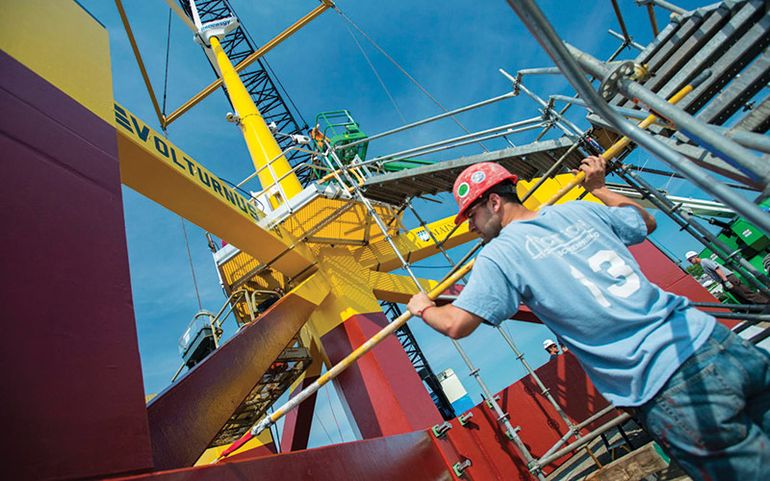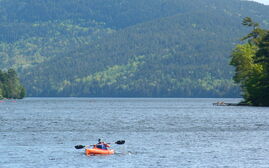Maine Aqua Ventus offshore wind power project faces delays, uncertainty
 Photo / Courtesy Maine Aqua Ventus
A worker at Cianbro's Brewer facility checks on a prototype offshore wind platform. A report concludes that offshore wind is a “significant economic opportunity for job growth” that could support an annual average of more than 2,100 jobs through 2030.
Photo / Courtesy Maine Aqua Ventus
A worker at Cianbro's Brewer facility checks on a prototype offshore wind platform. A report concludes that offshore wind is a “significant economic opportunity for job growth” that could support an annual average of more than 2,100 jobs through 2030.
Maine's tumultuous relationship with wind power had a setback recently.
The Maine Public Utilities Commission unanimously agreed early this month to reconsider terms of the offshore wind project developed by the University of Maine. The PUC had approved an agreement in 2014 under which Maine Aqua Ventus, as the wind power system is known, would sell power to Central Maine Power Co.
Before making its decision, PUC Chairman Mark Vannoy explained why the commission decided to reopen the 2014 term sheet, which the Maine Aqua Ventus consortium had argued was the equivalent of a contract — a point that Vannoy rebutted in his detailed and lengthy analysis.
“The commission understands the importance of this project to Maine Aqua Ventus and its stakeholders,” Vannoy said in a statement issued after the vote. “On the other hand, it is incumbent on the commission to ensure that the proposal continues to meet the legal requirements established by the Maine Legislature in 2010 and remains in the public interest of Maine citizens and businesses.”
Even after the four-year delay since the original agreement, the University of Maine reaffirmed its support for its Maine Aqua Ventus project, saying it “is extremely committed to this project, and we are confident that we can answer the PUC's questions to establish a power purchase agreement that allows the project to move forward as soon as possible.”
The stakes are high for Maine, given the accelerating pace of offshore wind development on the East Coast and throughout the world. The Berkeley, Calif.-based American Jobs Report concluded that the Aqua Ventus project and UMaine's patented floating hull technology offered “significant economic opportunity for job growth” that could support an annual average of more than 2,100 jobs through 2,100.
Since the term sheet was initially approved in February 2014, significant changes in energy markets and technology, as well as changes to some of the specific provisions of the Maine Aqua Ventus project and proposal, had occurred, Vannoy said.
Before finally approving a 20-year contract with Maine Aqua Ventus — which the PUC estimated would cost CMP's ratepayers more than $200 million over that period — Vannoy asserted that the PUC was obligated to review the terms of power purchase agreement in the context of these changed circumstances.
Read more
Isle au Haut to build solar-powered smart energy microgrid
Expanded energy training center signals growing demand for skilled technicians
Fiberight waste-to-energy site to convert tons of trash to energy or recycling
Summit Natural Gas of Maine project nears the five-year finish line
CMP aims to deliver Canadian hydropower to Bay State utilities by 2022
Maine colleges continue to tackle energy sustainability
Islands aim for energy independence
Electric vehicle public infrastructure coming to Maine as state reduces dependence on fossil fuels
Isle au Haut to build solar-powered smart energy microgrid
Expanded energy training center signals growing demand for skilled technicians
Fiberight waste-to-energy site to convert tons of trash to energy or recycling
Summit Natural Gas of Maine project nears the five-year finish line
CMP aims to deliver Canadian hydropower to Bay State utilities by 2022
Maine colleges continue to tackle energy sustainability
Islands aim for energy independence
Electric vehicle public infrastructure coming to Maine as state reduces dependence on fossil fuels














Comments